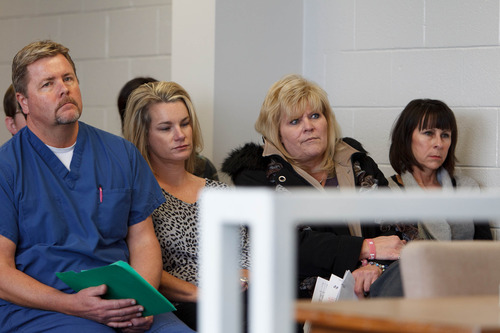This is an archived article that was published on sltrib.com in 2013, and information in the article may be outdated. It is provided only for personal research purposes and may not be reprinted.
Ogden • A judge ruled Wednesday that not all of one-time death row inmate Douglas Lovell's admissions in court to a 1985 murder may be used at his new trial scheduled for next year.
In April, 2nd District Judge Michael Lyon heard arguments regarding whether Lovell's admission during his 1993 sentencing hearing about killing Joyce Yost while under oath and on the witness stand could be used at an upcoming trial.
In his written ruling, Lyon said that while statements made by Lovell during questioning by his attorneys and prosecutors could be used at the February 2014 trial, a 12-page letter that he read in open court before questioning took place was not admissible.
In 1993, Lovell voluntarily took the stand during his sentencing hearing and detailed how he sexually assaulted Yost and later murdered her to keep her from testifying at his rape trial, according to court documents.
Lovell — who pleaded guilty to aggravated murder — said he kidnapped the 39-year-old Ogden woman from her home, killed her and buried her body in the mountains east of Ogden.
Lovell, now 55, was sentenced to death, but the Utah Supreme Court in 2010 ruled he could withdraw the guilty plea because he should have been better informed of his rights during court proceedings.
In a motion filed last month, Lovell's attorneys argue that Lovell's damning testimony should not be allowed at his new murder trial because it violates his right against self-incrimination. The lawyers argue that Lovell's statements in 1993 were made in an attempt to gain leniency from the judge and to avoid the death penalty, and that Lovell did not voluntarily waive his right against self-incrimination.
However, Deputy Weber County Attorney Gary Heward argues in court papers that Lovell was never required to take the witness stand, be placed under oath and confess to the killing. He further argues that in voluntarily testifying, Lovell waived his Fifth Amendment privilege against self-incrimination.
Heward argued that Lovell's testimony was not part of a plea deal with the state, but instead was Lovell's way of coming clean.
Lyon said in his ruling that the letter Lovell read in court would properly be classified as an allocution statement, not testimony. An allocution statement, which Lyon describes as an "unsworn plea for mercy," is not admissible in future prosecutions, Lyon wrote. Lyon said he classified this letter as such because it contained typical allocution statements, such as "personal statements of remorse and plans for the future."
Lyon also ruled that statements Lovell made to law enforcement before entering his guilty plea were inadmissible at trial, along with statements made at his change-of-plea hearings and in a pre-sentence report.
However, Lyon said prosecutors can use Lovell's alleged confession during a 2005 evidentiary hearing that was part of his appeal of the original murder conviction.
Lovell's plea deal with prosecutors spared him the death penalty, so long has he led authorities to Yost's grave. However, despite trips to the mountains to search for her body, Lovell was unable to locate the woman's remains prior to his sentencing date.
Lovell's new trial is scheduled for February 2014 — nearly 29 years after Yost's murder.
Meanwhile, Lovell is serving up to life in prison for raping Yost, whose preliminary hearing testimony was used to convict Lovell in 1985. He was charged with her murder in 1992.





